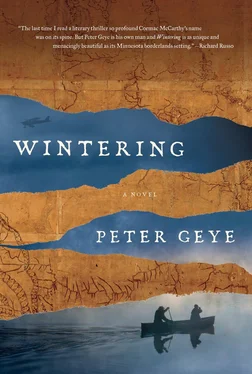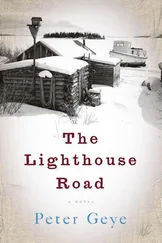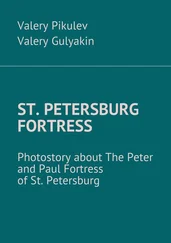“Of course I do.”
“I said maybe you’d be able to help me understand why he’d set off again.”
“I remember, Gus.”
“I thought if I told the story of that winter, if I told you all those secrets, I’d feel better. I thought life would make more sense.”
“Do you feel better?”
“I believe I do.”
“And does life make any more sense?”
“Does it ever?” He nodded at Rebekah’s portrait. “You know, there’s more than a glancing resemblance between her and Signe. I’d never really noticed before.”
“I often thought the same thing. Not about the painting, but about the two of them.”
“No, life doesn’t make any more sense.” He turned to me and smiled. “Let’s go upstairs. For one more look from on high?”
Up we went, those steps I’d walked more than any others in my life.
On the third floor he said, “What a rousing success, eh, Berit?”
“It was quite a day.”
Out the window, down below, a crew was disassembling the bleachers.
“You’ve really done something amazing here. I wish I could have articulated that better in my speech.”
“It was a beautiful speech.”
“I’d written something, but, standing on that boat, with all the kids from town there with their parents, it suddenly felt entirely too academic. So I winged it.”
“Even so, it was lovely.”
“I’m not fishing for compliments.” He smiled almost to the point of blushing and then turned to gaze out the window.
After a while he said, “I was thinking about my dad an awful lot today. Especially standing on that boat.”
“I thought of him, too.”
Another moment passed.
“I was also thinking today about our walk up to the Devil’s Maw, Berit. About what you said.”
Now I turned to look at him.
“About my father keeping some secret from you. And how that made you feel.”
I kept my eyes on him until he faced me. “What about it?” I asked.
“You’re not the only one he kept secrets from. That’s all.”
“I guess we all have some.”
“You sure do,” he said, then gave me another weak smile.
“Not so many as you might think,” I said.
Now it was Gus keeping his eyes on me.
“What?” I said.
“Downstairs just now, I said life didn’t make any more sense now than it did on that day Dad disappeared. But, still, I think I understand it better. Can those things both be true at the same time?”
“I’m a small-town girl, Gus. I never went to college. Never traveled the world. I wouldn’t have an answer to that question.”
“You’ve never fooled me, though.”
I smiled.
“Tell me that story, Berit. The one that started all of this. Tell me that, and then I promise we can move back to the here and now.”
“I knew this was coming. It had to. I’m glad you see that, too.”
“So you’ll tell me?”
“No, I won’t. I can’t.” I took my purse from my shoulder, opened it, and removed the envelope I’d been carrying around in there for weeks. “Maybe I should’ve told you all this back in November, when Harry vanished.”
He took the envelope and flipped the unsealed flap open. “What’s this?”
“It’s something I wrote down for you. Things I didn’t think I could tell you. Maybe this will help you understand.”
YOUR FATHER and I didn’t speak often of what happened to his own father, though I recall those conversations very well, and one in particular. We were sitting on his deck on a late-spring afternoon. This was some ten years after the Riverfish brothers rescued the two of you. The Burnt Wood was surging with snowmelt and two days and nights of wild rain. We could feel it thundering through our bodies even a hundred feet away. Your father cradled his coffee in his hands, his eyes fixed on the river. He was quiet. As always, he was quiet.
I watched him staring at the river, then watched it myself. I remember thinking what a raucous and beautiful thing it was. And how patient it was, too. It had flowed for thousands of years to make itself as it was just then. I’d seen it freeze and thaw and freeze and thaw over and over, year after year, and this was only the merest fraction of its existence over those millennia. What a beautiful notion this was.
As he did so often, your father read my mind. “I was reading a book by Louis Agassiz last night,” he said.
“Was he a scientist?”
“That’s right. He thought there was once an enormous sea here. It was called Lake Agassiz.”
“Back in the Ice Age?”
He nodded.
“I believe I’ve read about that myself,” I said. “What of it?”
“You think it’s true?”
“That this land was once a sea?”
He nodded again.
“I do, yes.”
“Think it will be again someday?”
“Someday?” I said, and caught him with my smile. “The way that river’s running, it might be as soon as this weekend.”
Precisely then we heard a terrific boom. We flinched simultaneously and looked hard through the mist and saw a lump of ice the size of a misshapen truck that had rolled out and flattened several trees on the other shore.
“My goodness,” I said.
“Let’s have a look.”
We walked across the clearing and stood on the river’s edge, which was some thirty feet higher than it would be come August. The water was one long manic sault, churning and lapping furiously back on itself. Countless chunks of ice were coursing down the current, but this massive piece that must’ve calved from the falls upriver was now dragging the felled trees along with it, completely at odds with its essence, but in fact no different from the livid river itself. It was the same stuff, after all.
I could see from the look on your father’s face that this ice troubled him, too. As if he’d seen a ghost. He stared at it for a long time before saying, “I never thanked you.”
This perplexed me. “Thank me?”
“For those fried potatoes.”
I must have looked stunned.
“On the day we first met.”
“I know what you’re talking about,” I told him.
Now, understand, my memory is a cursed thing. It grabs hold of everything without my say. It always has. And it stays with me. I sometimes have trouble remembering where I put my teacup, but I can tell you exactly what I wore to Rebekah Grimm’s funeral. Exactly who was there and what the pastor said. I can recall whole conversations with my mother from sixty years ago. In many ways it has been unfair, going through life not being able to forget. But what is sometimes a curse also allows me to conjure up the story of what happened to your own father when he was still just a boy. It was, I am sure, the prologue to all his life after.
—
It happened on a morning in February, an easterly wind blowing cold across the lake. The sun rose over low clouds. Snow was in the offing from the east, as it had come overnight and would again that morning, blowing up off the lake and over the breakwater. But just then the sky above was blue and unbitter, and your father and his father, Odd, hauled their toboggan out from the cove. I cocked my ear to the ceiling above and listened for the sound of Rebekah’s arthritic feet crossing the floor.
I sorted the mail, keeping one eye on your father as he augured holes a quarter mile offshore. I watched them sit on the upturned buckets and drop their lines in the water as I slid letters into boxes and wondered why, after nearly a month here in Gunflint, I’d never seen that boy — your father — anywhere but out on the ice.
At nine o’clock I went upstairs and made tea for Rebekah, as I did each morning. She stood, as she nearly always did, at the window, her fingertips touching the glass, her head down, and her eyes fixed on the lake. She turned when she heard me. “Oh,” she said. It was the first thing I’d heard from her in weeks. Maybe it was meant as thanks.
Читать дальше












